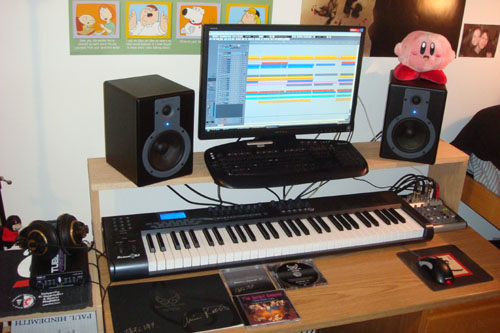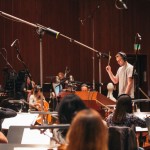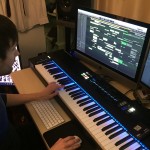Josh Whelchel is one of the youngest talents in the realm of Western VGM. His career in game music started at the age of 15, and his works include Mark Pay’s The Spirit Engine series, among other titles. Thus far, Whelchel has composed music almost exclusively for independent developers, and his style is as close to Nobuo Uematsu as it is to Jack Wall.
If you’re a kid in a basement with a small studio set up, and you aspire to one day compose music for commercial use (including video games), you can either look up to Whelchel, be jealous of him, or try to out-do him. Whatever your plans, you’ll want to check out our lengthy interview with this young prodigy.
And you’ll be able to read said interview… after the jump!
OSV: Josh, thank you for taking the time to speak with us at OSV.
Whelchel: It is most certainly my pleasure – thanks for having me!
OSV: Your work in game music has been, thus far, for smaller, independent game developers. You have a close relationship with Mark Pay, having composed for both The Spirit Engine and The Spirit Engine II. Can you give us some history as to how you got started and when your relationship with Mark began?
Whelchel: A number of years ago I got into a small game development circle known as the “Click Community,” which revolved around the use of Clickteam products for easy game creation. I was very young at the time (I want to say as young as nine years old?) and had also been taking classical piano lessons. It didn’t take me too long to realize that I had absolutely no talent at creating visual art and that I had best stick to my musical talent. I had written music for only a handful of projects when I first contacted Mark with interest in writing for his upcoming game, The Spirit Engine, which had a lot of community buzz going around. At the time, I had no idea how much success the game would see in the freeware community, or the impact it would have on my career.
I sent him two pieces I had written by that time (this was around my freshman year of high school, I recall) and he enjoyed them and graciously accepted my request. From there, I spent a lot of time looking at outlines and other various demos and representations of the game until I created a decent sized soundtrack for The Spirit Engine. Looking back, there are many changes I would make, but still I love the nostalgic sound I managed to capture back then. It was sweet, sweet news when Mark informed me of his intentions to create a much grander and potentially commercial sequel.
OSV: Recently, you posted a live arrangement of one of your best-loved pieces from The Spirit Engine series through Twitter and thesixtyone. Tell us about this recording, and why you chose this song.
Whelchel: “A Lost Dream in an Unwelcome Reality” actually has a huge meaning in my personal life. I wrote the very first draft of the melody (which appears in “A Lost Dream” most notably on The Spirit Engine II soundtrack) during a very emotional time of my life, and it fit very well as one the game’s many themes. The reason for the arrangement was not based on promotion at all; rather, it was an arrangement I wrote for performance at the Cincinnati Conservatory of Music in December 2008.
The arrangement itself symbolizes how once beautiful and tranquil things in one’s life can become distorted and be lost over time. For example, how relationships between people can change based on the separate paths that people take in their lives. The melody from “A Lost Dream,” which is the main motif in the arrangement, symbolizes those relationships. The transfiguration of the melody through the progression of the piece is what results in the “Unwelcome Reality.” To sort of state the obvious here, “A Lost Dream” represents, to me, love – not in any particular instance or manifestation, but rather as a presence that follows us through our lives and grows, much as we do. While the relationships we experience are each their own entities, the overall feeling of connection and unity that is expressed in the experience of love is universal. The music is simply an expression of the feelings that are expressed when love can be clouded and transformed into something unexpected, an experience altogether painful and almost unreal – thus the “Unwelcome Reality.”
Choosing this particular piece to have performed and recorded over the other two was an easy decision, and I look forward to having more pieces performed like this as my career and skills progress.
For those interested, the piece can be heard at thesixtyone or on my Twitter where I release free music every Monday, Wednesday, Friday, and Sunday (and usually on the offdays there is a treat, too).
OSV: What kind of software and hardware do you use for your game soundtracks? Tell us about the composing and recording process from your eyes.
Whelchel: It all depends on the medium and restrictions given by the developer. For Bonesaw: The Game, I stuck with Modplug Tracker and created my sound library out using a number of my software synthesizers and Renoise. For The Spirit Engine II, I used a combination of the following tools which I now use regularly: Renoise, Cakewalk Sonar, East West/Quantum Leap Symphonic Orchestras and other soundsets, an M-Audio Axiom 61, and my pair of M-Audio studio monitors. I have a separate PC that I use for my compositions only, and otherwise remains well rested.
The composition process also varies on what I’m trying to write. Sometimes I am able to simply improvise a melody on the piano and then write each part around it, visualizing the score in my head as I go. Other times, I will score an entire piece out in notation before sitting down to record it (as I did with “Finale and A Lost Dream”). The reason I use Renoise for some pieces is because it brings together the tracking methodology I grew up with and opens up the use of my new sample libraries. I seem to write entirely different music when the music is scrolling vertically, as opposed to traditional horizontal staff lines. It is also typically music that I cannot play right away on the piano, so it seems a little less limited.
OSV: You’ve listed both Western and Japanese composers as sources of influence. From Nobuo Uematsu to Hans Zimmer, you find something special in each. Yet, your synth music reflects the “glory days” of SNES and PlayStation RPG music from Japan. How do you classify your music, particularly in East/West terms?
Whelchel: I think it is probably best described as Eastern music, in terms of melodic reference. My harmonization and arrangements are more typical of Western music, but I also have a really hard time classifying them even as that. I’ve recently been listening to a lot of Yoko Kanno, a composer I enjoyed when I was younger, and it is very interesting for me to hear how influences from her music have affected my own work. In that regard, my music is very similar to Eastern music, especially if you bring into account my love for Uematsu and Mitsuda (I also very much loved the music of Final Fantasy Tactics, composed by Sakimoto and Iwata). However, if you examine the percussive elements of my arrangements, you’ve definitely got something closer to Zimmer, Bobby Prince, or dare I say, Timbaland (yikes!) – clearly Western influences. Actually, I think the best way of describing my music in terms of known composers would be to say something ridiculous along the lines of “Nobuo Uematsu and Jack Wall with a touch of your favorite hip hop producer.”
One of my goals going into writing The Spirit Engine II was to marry the nostalgic sound of the SNES and PSX platforms with the grand orchestral sound we get in modern games and film. If you listen to tracks like “Out on the Town” and “Final Cry~~,” I think the goal is apparent. I grew up on PlayStation RPGs, so it wasn’t very hard for me emulate that sound. I also have a pretty big weak spot for FM Synthesis, and a lot of my more recent tracks feature that sound.
OSV: Composers for games are getting more and more notoriety in North America, thanks in part to concert series such as Video Games Live and PLAY!. Have you ever thought about doing a tour of your own music, perhaps collaborating with other “indie” game composers? And if not, what do we at OSV have to do to convince you?
Whelchel: I haven’t considered it seriously, although it is a huge dream of mine to one day do so. Unfortunately, I do not have the time or resources to put together something like that. I guess the best convincing would be to pay for performers and rehearsal time, and then I’d have a huge recital! Hell, we could do it at the Hollywood Bowl just for kicks!
OSV: What are your favorite musical pieces from your own body of work, and why?
Whelchel: “Finale and A Lost Dream” from The Spirit Engine II is an easy favorite of mine, just because of the significance it has in my life – it’s not only very personal but it’s also the capstone of my most successful work to date. Besides that, I tend to like pieces of mine that seem like strange choices to others, and I’ll just name a few here: “get puck in here” from Bonesaw for the intensity, “Executive Pay II” from The Spirit Engine because of the oldschool modular sound, “Devil’s Weapon” from The Spirit Engine II: Premonitions (a pre-release album for the game) just because of how I managed to squeeze a few important motifs in there, and “A Man’s Lost Heart” from The Spirit Engine II because it reminds me of some serious oldschool Uematsu.
OSV: Quick! List your five favorite game soundtracks (excluding your own)!
Whelchel:
– Final Fantasy Tactics
– Chrono Trigger
– Myst III and IV (Jack Wall is phenomenal)
– All of Bobby Prince’s ADLIB works – Doom, Duke Nukem II, and Wolfenstein 3D specifically
– And… I’m going to cram Final Fantasy VII through X as one delicious entry. (Specifically FFVIII, “Eyes on Me” is amazing, and his use of motifs starting with that soundtrack is phenomenal)
OSV: What are you working on next? Please tell us!
Whelchel: Right now I am putting together a free album of music similar to what you’ll hear in The Spirit Engine II. I want to get music out there for everyone to enjoy (and it also so happens that I absolutely love getting scrobbles on last.fm – it’s like a drug!). But seriously, music is one of the universal pleasures that all of humanity shares, and it’s also the one medium that I feel can truly express ANY emotion. I like to tell stories with my music, but no story is very good if nobody can hear it be told!
I am also working on an Indie project in my free time called Indie Brawl, a game similar to Super Smash Bros which brings together characters from independent games. The roster, at present, includes Cave Story, Bonesaw, Noitu Love, Aquaria, and others… so far I’ve put together draft remixes for Bonesaw, Aquaria, and Noitu Love 2 (click the link to hear a sample from the upcoming soundtrack!).
Last, but certainly not least, I am working on an Electro-acoustic piece for the Cincinnati Conservatory of Music that will be debuted in March – should be a very interesting piece and I look forward to finishing it.
And don’t worry, I have an extremely innovative RPG project in talks right now that I’m very excited about.
OSV: Thank you again, Josh, for your time and your answers.
Whelchel: The pleasure is certainly all mine! I am both flattered and pleased for this experience. Be sure to follow me on Twitter for tons of free music – and to become a fan on my Facebook page! And finally – I recently released TSE2 – Selections for free (which curiously increased sales of the full 4-disc OST…hmm…). So be sure to check out this album!
All Photography Courtesy of Bailey Long
Tags: Bonesaw, Indie, Indie Brawl, Interviews, Josh Whelchel, The Spirit Engine













































Wow, never heard of this guy. This is pretty freaking cool. Nice to know that trackers are still getting used out there.
I personally chose to just be jealous of him and to one day to use his talents for my own profit
If anyone is in the Cincinnati area, be sure to follow him as he has some live pieces coming up in the next four or five weeks and on a somewhat regular basis after that!
A fellow Modplugger. Yay!
[…] up until April 24th. If you want to know more about him, you can visit his about page and check out this interview from […]